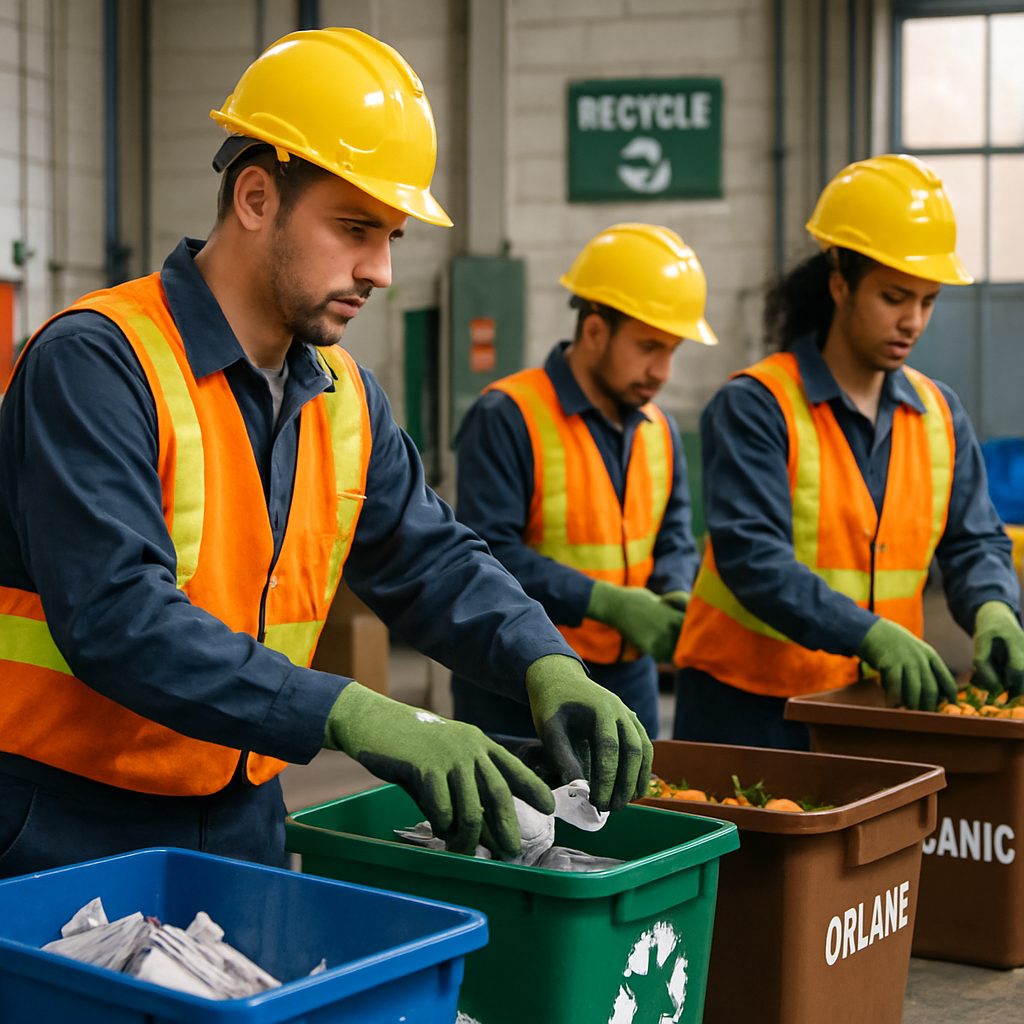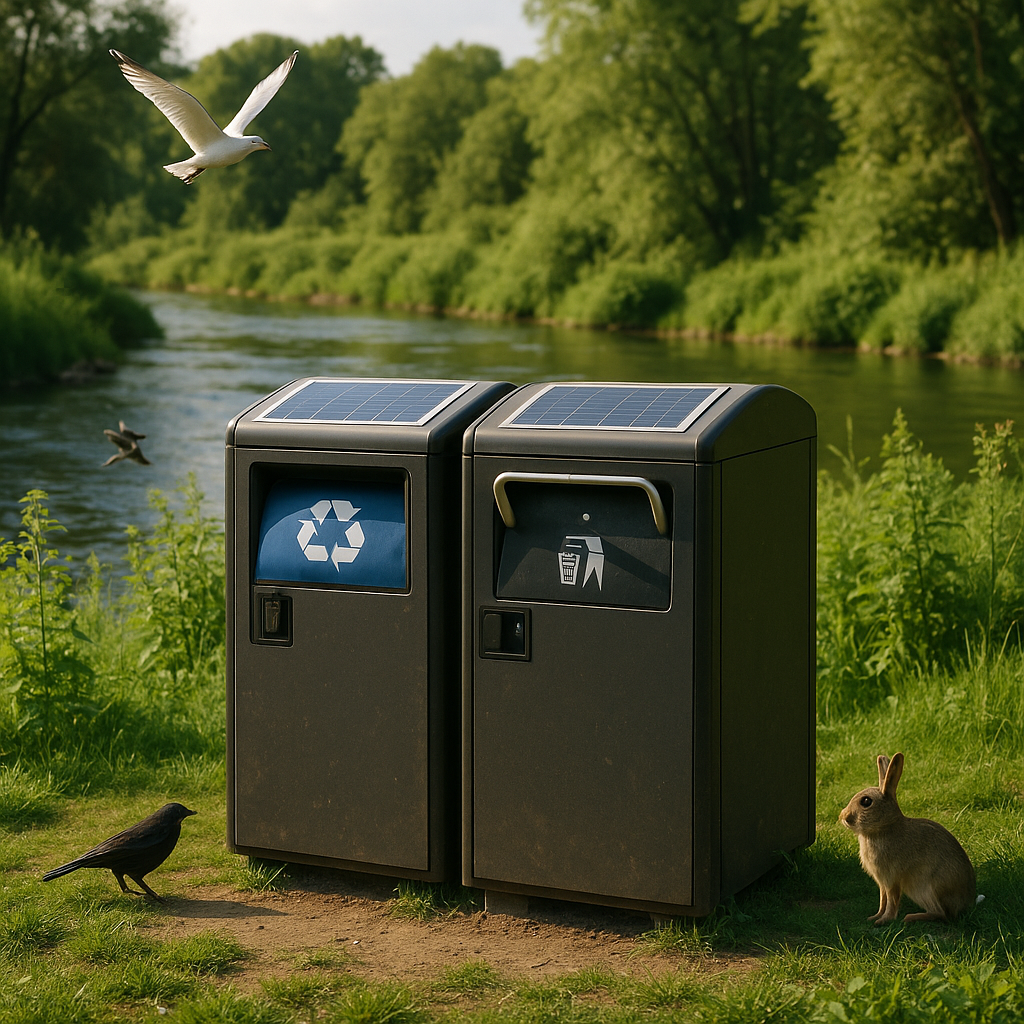5901 Botham Jean Blvd, Dallas, TX 75215
How Sustainable Waste Management Is Shaping a Greener Future
August 22, 2025Global waste production is projected to increase by 70% by 2050, with over 2 billion tons of municipal solid waste already generated annually worldwide. This growing crisis requires immediate action. Sustainable waste management is crucial for our planet’s health and future generations.
Sustainable waste management involves practices designed to reduce environmental impact while promoting resource conservation. It includes strategies for waste reduction, increasing recycling rates, and methods to minimize pollution from disposal. These practices protect ecosystems from harmful pollutants and conserve valuable natural resources that could be depleted through continual extraction and production.
As landfills reach capacity and waste-related greenhouse gas emissions rise, implementing sustainable waste management strategies is essential for environmental protection. By diverting waste from landfills through recycling and composting, we can significantly reduce methane emissions. This approach offers economic benefits through resource recovery and supports broader environmental goals for a greener, more sustainable future.
How Does Sustainable Waste Management Benefit the Environment?

Greenhouse Gas Reduction
Sustainable waste management practices significantly reduce greenhouse gas emissions that contribute to climate change. When organic waste decomposes in landfills, it produces methane—a greenhouse gas 25 times more potent than carbon dioxide in trapping heat in the atmosphere. Diverting organic materials to composting facilities instead of landfills substantially decreases methane emissions.
Proper waste management systems help capture methane gas from existing landfills and convert it into energy. This process not only prevents harmful emissions but also creates a renewable energy source that can power homes and businesses. The reduction in methane emissions alone makes sustainable waste management a powerful tool in combating global warming.
The impact of these reductions is substantial. Recycling programs in Germany, for instance, have helped reduce CO2 emissions by approximately 56 million tons annually through comprehensive recycling schemes and waste diversion strategies.
Resource Conservation
Recycling and reusing materials conserve valuable natural resources by reducing the need for raw material extraction. Recycling paper saves trees; recycling metals reduces mining; recycling plastics decreases petroleum consumption. This conservation extends the lifespan of these resources for future generations.
Manufacturing products from recycled materials typically requires less energy than producing them from virgin resources. For example, recycling aluminum saves up to 95% of the energy needed to make the same amount of aluminum from its virgin source. Paper recycling saves about 60% of energy compared to making new paper from trees, directly reducing carbon emissions.
The conservation benefits extend beyond energy. Recycling one ton of paper saves approximately 7,000 gallons of water and reduces water pollution by 35%, demonstrating how sustainable waste practices protect multiple natural resources simultaneously.
Pollution Prevention
Traditional waste disposal methods often lead to significant air, water, and soil pollution. Landfills can leach harmful chemicals into groundwater. Incineration without proper controls releases toxins into the air. Improper disposal of hazardous waste contaminates ecosystems.
Sustainable waste management prevents these pollution forms through proper sorting, treatment, and disposal techniques. By ensuring hazardous materials are handled separately and safely, we protect water sources from contamination. Advanced filtration systems in modern waste processing facilities capture particulates and prevent air pollution.
These pollution prevention measures have far-reaching benefits for wildlife and ecosystems. By reducing contamination of natural habitats, sustainable waste management helps preserve biodiversity and maintain ecosystem health. Cleaner air and water support healthier communities for both humans and wildlife.
Climate Change Mitigation Through Resource Efficiency
Sustainable waste management promotes a circular economy where materials are kept in use for as long as possible, minimizing waste generation and maximizing resource efficiency. By extending product lifecycles through reuse and recycling, we reduce the environmental impact associated with extracting and processing new materials.
Waste-to-energy technologies represent another important aspect of sustainable waste management. These systems convert non-recyclable waste into usable heat, electricity, or fuel through processes like combustion, gasification, and anaerobic digestion. Modern facilities employ strict emission controls to ensure these processes are environmentally sound.
The climate benefits of resource efficiency are significant. Studies show that comprehensive recycling programs can reduce a community’s carbon footprint by up to 25%. Combined with waste reduction strategies, these savings can climb even higher.
Ecosystem Protection
Perhaps the most profound environmental benefit of sustainable waste management is the protection it offers to entire ecosystems. By reducing pollution and resource extraction, these practices help preserve natural habitats and the species that depend on them.
Proper waste management reduces the risk of wildlife exposure to hazardous materials. Marine animals, for instance, suffer greatly from plastic pollution—sustainable waste practices that keep plastics out of oceans protect countless species from ingestion and entanglement hazards.
The ecosystem benefits extend to soil health as well. Composting organic waste creates nutrient-rich soil amendments that improve agricultural productivity without chemical fertilizers. This natural approach supports healthier soil ecosystems and more sustainable food production systems.
What are the Economic and Social Impacts of Sustainable Waste Management?
Economic Benefits of Sustainable Waste Management
Sustainable waste management offers significant economic opportunities through job creation in recycling and waste management industries. These jobs include roles in collection, sorting, processing, and administration. The recycling sector alone generates more jobs per ton of material than traditional landfill operations.
For businesses and municipalities, sustainable waste practices can lead to substantial cost savings by lowering waste disposal expenses. Companies implementing waste reduction strategies often report reduced operational costs due to decreased landfill tipping fees and reduced raw material purchases. For instance, recycling aluminum saves 95% of the energy required to produce it from raw materials.
Economic benefits also extend to broader market opportunities. Businesses focusing on waste reduction and recycling can access new revenue streams through the sale of recovered materials. Extended Producer Responsibility frameworks encourage companies to design products with recycling and reuse in mind, fostering innovation and economic growth in sustainable product development.
Financial Advantages for Communities
Municipalities implementing comprehensive recycling programs experience both direct and indirect economic benefits. Tax incentives and grants are often available to communities with forward-thinking waste management policies, supporting infrastructure development and program expansion.
Sustainable waste management also promotes local economic development through increased tax revenue. Communities with robust recycling programs often see higher property values and increased business investment in areas with strong environmental credentials.
Resource conservation is another significant economic benefit. By recovering materials through recycling, communities reduce reliance on virgin resources, which typically require more energy and cost to extract and process. This conservation approach creates a more resilient local economy, less vulnerable to resource price fluctuations.
Social Benefits: Improving Public Health
The social impacts of sustainable waste management are equally important. Proper waste handling significantly enhances public health by reducing pollution and eliminating disease vectors associated with improper waste disposal. Communities with effective waste management systems experience fewer respiratory illnesses, waterborne diseases, and other health issues linked to environmental contamination.
Air quality improvements result from reduced waste incineration and decreased methane emissions from landfills, while water quality benefits emerge as fewer contaminants leach into groundwater and surface water sources. These environmental health improvements translate directly to reduced healthcare costs and improved quality of life for residents.
Sustainable waste management practices also promote environmental justice by ensuring that waste facilities do not disproportionately affect disadvantaged communities. By distributing waste management responsibilities and facilities equitably, municipalities can address historical inequities in environmental burdens.
Community Engagement and Social Cohesion
Beyond health benefits, sustainable waste management fosters community engagement through recycling programs and environmental awareness initiatives, creating opportunities for civic participation and community building. School recycling initiatives educate future generations, while community clean-up events strengthen neighborhood bonds.
Educational components of sustainable waste programs increase environmental awareness and encourage behavioral changes that extend beyond waste practices. Communities engaged in recycling and waste reduction often demonstrate greater environmental stewardship in other areas, such as water conservation and energy efficiency.
Sustainable waste management contributes significantly to building resilient communities. The social networks formed through community recycling initiatives strengthen local support systems. The skills and awareness developed through these programs transfer to other community challenges, enhancing overall resilience.
Quality of Life Improvements
The cumulative effect of sustainable waste management is an improved quality of life for residents. Clean streets, reduced litter, and elimination of illegal dumping create more pleasant living environments. Aesthetic improvements influence community pride and psychological well-being.
Sustainable waste management also creates educational opportunities for schools and community groups, developing practical skills in resource management, environmental science, and civic responsibility. The knowledge gained through these educational initiatives empowers individuals and strengthens community capacity.
For businesses, sustainable waste practices improve corporate image and employee satisfaction. Companies with strong environmental programs often report higher employee retention and easier recruitment. This social benefit translates to economic advantages through reduced hiring costs and improved productivity.
What are the Challenges in Implementing Sustainable Waste Management?

Implementing sustainable waste management systems faces significant hurdles despite their critical importance to environmental conservation and resource efficiency. These challenges require strategic approaches and collaborative solutions to overcome.
Infrastructure Limitations
One of the most pressing challenges is inadequate infrastructure for proper waste management. Many communities lack the necessary facilities for effective recycling, composting, and waste processing. Collection systems often fail to separate waste streams properly, resulting in contamination that reduces recycling efficiency.
Developing regions face particularly severe infrastructure gaps. Without proper transfer stations, material recovery facilities, and sanitary landfills, communities resort to open dumping or burning waste. This creates severe environmental hazards and misses opportunities to recover valuable resources.
The high capital investment required for waste management infrastructure presents another significant barrier. Building state-of-the-art recycling centers, composting facilities, and waste-to-energy plants demands substantial funding that many municipalities simply cannot afford without external support.
Financial and Economic Constraints
The economics of sustainable waste management present complex challenges. Initial implementation costs are substantial, creating resistance from both public and private sectors. Without clear financial incentives, businesses and local governments often opt for cheaper, less sustainable disposal methods.
Operating costs for advanced waste management systems can exceed traditional landfilling in the short term. This creates budget pressures for municipalities already facing financial constraints. The true environmental costs of improper waste disposal rarely factor into financial decisions, making sustainable alternatives appear less economically viable.
Limited funding mechanisms present another obstacle. Municipalities struggle to secure adequate investment for waste management infrastructure, particularly in developing economies where competing priorities like healthcare and education take precedence.
Policy and Regulatory Barriers
Outdated or insufficient regulations undermine sustainable waste management efforts. Many regions operate with fragmented policy frameworks that fail to incentivize waste reduction or recycling. Without clear standards and enforcement mechanisms, sustainable practices remain optional rather than mandatory.
Regulatory inconsistencies across jurisdictions create compliance challenges for waste management operators working across multiple areas. This regulatory patchwork makes it difficult to implement standardized approaches and creates confusion about proper procedures.
The slow pace of policy adaptation presents another challenge. As waste streams evolve with changing consumption patterns and new materials enter the market, regulations often lag behind. This regulatory gap leaves emerging waste challenges unaddressed.
Public Awareness and Behavioral Challenges
Insufficient public awareness represents a fundamental obstacle to sustainable waste management. Many people remain unaware of proper waste separation techniques or the environmental impact of improper disposal. This knowledge gap leads to contamination in recycling streams and reduces program effectiveness.
Changing established behaviors around waste disposal proves difficult. Convenience often drives disposal decisions, and sustainable options may require more effort from consumers. Without strong motivation or incentives, many people revert to familiar but unsustainable practices.
Misconceptions about waste management also create barriers. False beliefs about the fate of recycled materials or skepticism about environmental benefits can undermine participation in sustainability programs. Clear, factual communication is essential to overcome these misconceptions.
Technical and Operational Challenges
Managing diverse and complex waste streams presents technical difficulties. Modern consumer products often contain multiple materials that are challenging to separate and recycle. Composite packaging, electronic waste, and hazardous materials require specialized handling that many systems cannot provide.
Technological limitations hinder efficient processing. While advanced sorting technologies exist, they remain expensive and sometimes unreliable. Manual sorting continues to play a major role in many facilities, increasing labor costs and reducing efficiency.
Lack of standardization in waste collection and processing creates operational inefficiencies. Different municipalities may have varying requirements for waste separation, creating confusion for residents and businesses operating across jurisdictions.
Collaborative Solutions
Addressing these challenges requires unprecedented collaboration between stakeholders. Governments must create enabling policy environments and provide financial incentives for sustainable practices. Businesses need to embrace extended producer responsibility and design products with end-of-life considerations in mind.
Communities play a vital role through active participation in recycling programs and advocating for better waste management systems. Educational institutions can contribute through research and development of innovative technologies and approaches to waste management.
International cooperation is essential, particularly for addressing waste issues that cross borders. Knowledge sharing, technology transfer, and coordinated policy approaches can help developing regions implement sustainable systems more quickly and effectively.
Conclusion: Paving the Way to a Greener Future Through Sustainable Waste Management

Sustainable waste management is a key element in our global efforts to create a greener, more sustainable future. By adopting practices such as the 3Rs (Reduce, Reuse, Recycle), composting, and waste-to-energy technologies, we can significantly reduce our environmental impact while generating economic and social benefits. These strategies help minimize pollution, conserve resources, and create jobs, all of which improve community health.
Achieving sustainable waste management requires coordination and commitment across society. Governments must implement supportive policies and invest in infrastructure. Businesses should adopt sustainable production methods and packaging. Individuals can make daily choices that reduce waste generation. Together, these efforts can overcome challenges and expedite our progress toward a world where waste is minimized, resources are conserved, and environmental health is prioritized. Every action counts in this collective journey.
Ready to advance your sustainable waste management efforts? For expert guidance and comprehensive recycling solutions tailored to your needs, contact Okon Recycling at 214-717-4083.
